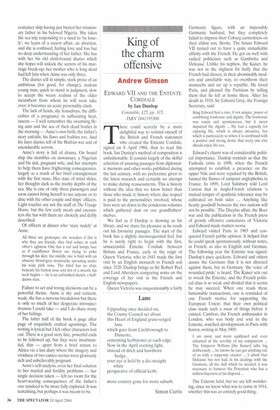King of the charm offensive
Andrew Gimson
EDWARD VII AND THE ENTENTE CORDIALE by Ian Dunlop Constable, £25, pp. 315, ISBN 1841195308 There could scarcely be a more delightful way to remind oneself of the British and French statesmen who created the Entente Cordiale, signed on 8 April 1904, than to read this book. Ian Dunlop's method of composition is unfashionable. It consists largely of the skilful selection of amusing passages from diplomatic memoirs and other works published during the last century, with no preference given to the latest research and certainly no attempt to make daring reassessments. This is history without the idea that we know better than those who made it; history where due respect is paid to the personalities involved, whose lives were set down in the ponderous volumes which gathered dust on our grandfathers' shelves.
We feel as if Dunlop is showing us his library, and we share his pleasure as he reads out his favourite passages. The start of the book has a slightly inconsequential feel, but he is surely right to begin with the first, unsuccessful Entente Cordiale between Britain and France, early in the reign of Queen Victoria, who in 1843 made the first visit by an English monarch to French soil since 1520. Dunlop brings us Sir Robert Peel and Lord Aberdeen comparing notes on the coverage of her visit in the French and English newspapers.
Queen Victoria was unquestionably a fairly
Lane
Upgrading once decided on, the County Council set about this Heart of England grass-verged lane which goes from Litchborough to Duncote, cementing kerbstones at each edge. Now in the April evening light, instead of ditch and hawthorn hedge, your eye is held by a die-straight white perspective of official kerb; more country gone for more suburb. Germanic figure, with an impossibly Germanic husband, but they completely failed to impress their Coburg earnestness on their eldest son, Bertie. The future Edward VII turned out to have a quite remarkable affinity with the French. He got on well with radical politicians such as Gambetta and Delcasse. Unlike his nephew, the Kaiser, he was not in the slightest bit huffy that the French had chosen, in their abominably modern and unreliable way, to overthrow their monarchs and set up a republic. He loved Paris, and pleased the Parisians by telling them that he felt at home there. After his death in 1910, Sir Edward Grey, the Foreign Secretary, said:
King Edward had a rare, if not unique, power of combining bonhomie and dignity. The bonhomie was warm and spontaneous. but it never impaired the dignity He had a capacity for enjoying life, which is always attractive, hut which is particularly so when it is combined with a positive and strong desire that every one else should enjoy life too.
Edward's charm was of considerable political importance. Dunlop reminds us that the Fashoda crisis in 1898, when the French attempted to establish a presence on the upper Nile and were repulsed by the British, fanned the flames of rampant anglophobia in France. In 1899, Lord Salisbury told Lord Curzon that in Anglo-French relations 'a mutual temper of apathetic tolerance may be cultivated on both sides .... Anything like hearty goodwill between the two nations will not be possible.' The Dreyfus affair, the Boer war and the publication in the French press of grossly offensive caricatures of Victoria and Edward made matters worse.
Edward visited Paris in 1903 and conquered French public opinion. It helped that he could speak spontaneously, without notes, in French, as also in English and German. The following year the Entente was signed. Dunlop's pace quickens. Edward and others assure the Germans that it is not directed against them, but in Germany 'the voice of wounded pride' is heard. The Kaiser sets out to wreck the Entente, and the French political class is so weak and divided that it seems he may succeed. When one reads these lamentable transactions, one is reminded of one French motive for supporting the European Union: that their own political class made such a mess of things before it existed. Cambon, the French ambassador in London, who was body and soul in the Entente, watched developments in Paris with horror, writing in May 1905:
I am more and more saddened and even ashamed of the servility of my compatriots ... The Emperor William [the Kaiser] talks big deliberately ... he knows he can get anything out of us with a tuppenny cracker I admit that Delcasse has not had, in his dealings with the Germans, all the skill which he needed; it was necessary to humour the Potentate who has a million bayonets at his disposal ...
The Entente held, but we are left wondering, since we know what was to come in 1914, whether this was an entirely good thing.


































































 Previous page
Previous page